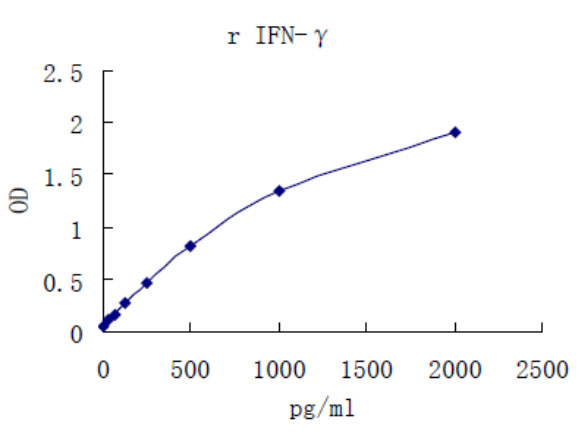Product Detail
Product NameRat IFN-γ ELISA kit
ApplicationsELISA
Species ReactivityRt
SpecificityNatural and recombinant Rat IFN-γ Ligand
Target NameRat IFN-γ
Application Details
Detect Range: 0.03 - 2.0 ng/mL
Sensitivity: 7pg/mL
Sample Type: Cell culture supernatant, serum, plasma (EDTA, citrate, heparin)
Sample Volume: 20 uL
Assay Time: 3 hour
Detection method: Colorimetric
Interferon gamma (IFN-γ) is a multifunctional protein first observed as an antiviral activity in cultures of Sindbis virus-infected human leukocytes stimulated by PHA (1). Produced by Tlymphocytes and natural killer (NK) cells, IFN-γ ?is now known to be both an inhibitor of viral replication and a regulator of numerous immunological functions. Human IFN-γ?is reported to be active only on human and non-human primate cells (5). The biochemistry and biological activities of the interferons have been extensively reviewed (2-9).
Rat IFN-γ cDNA encodes a 156 amino acid (aa) residue precursor protein with a putative 19 aa residue signal peptide that is cleaved to generate the mature protein which contains two potential N-glycosylation sites (10-12). Rat IFN-γ shares approximately 87% and 39% amino acid sequence identity with mouse IFN-γ and human IFN-γ , respectively. Consistent with their degrees of shared homology, rat A receptor for IFN-γ?has been identified and its gene localized to chromosome 6 (13,14). Apparently the product of a single gene, the receptor is a single chain 90 kDa glycoprotein that shows a high degree of species-specific binding of IFN-γ?(15-18).
Functionally, IFN-γ ?produces a variety of effects. Produced by CD8+, NK, gd,and TH1 T helper cells, IFN-γ ?has documented antiviral, antiprotozoal and immunomodulatory effects on cell proliferation and apoptosis, as well as the stimulation and repression of a variety of genes (19-22) he antiprotozoal activity of IFN-γ ?against Toxoplasma and Chlamydia is believed to result from indoleamine 2,3-dioxygenase activity, an enzyme induced by IFN-γ ?(23).The immunomodulatory effects of IFN-γ? are extensive and diverse. In monocyte/macrophages, the activities of IFN-γ?include: increasing the expression of class I and II MHC antigens; increasing the production of IL-1, platelet-activating factor, H2O2, and pterin; protection of monocytes against LAK cell-mediated lysis; downregulation of IL-8 mRNA expression that is upregulated by IL-2; and, with lipopolysaccharide, induction of NO production.Finally, IFN-γ?has been shown to upregulate ICAM-1, but not E-Selectin or VCAM-1, expression on endothelial cells.



 YES
YES



